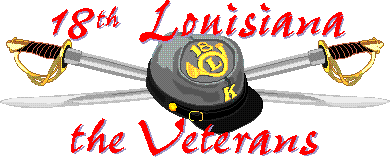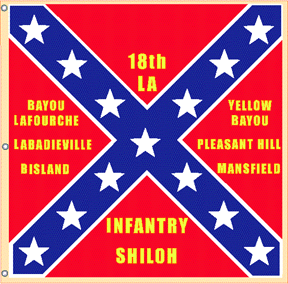
 Battle Flag
Battle Flag
of the
18th Regiment Louisiana Infantry
...Flag design is based on a small torn
section of the regimental battle flag which is on display in
the Confederate Museum, New Orleans, Louisiana. May 19,
1865. When the 18th Regiment was disbanded the flag
was torn into ten pieces and a piece given to each of
the ten company commanders. (Placement of Battle
Inscriptions is specualtive and based on similar Confederate
battle flags of the same period.)
 William R. Burke, Sergt., Pvt., 2nd Lt.,
Co.D.
William R. Burke, Sergt., Pvt., 2nd Lt.,
Co.D.
...At this point in time, we are still
searching for an image of 2nd Lt. William Burke and we hope
to add one in the forseeable future. Should any of his
decendants have a photo of him, and would gratiously care to
place a copy of his photo at this web site...this researcher
would be grateful.
~*~
William R. Burke
Sergt., Pvt., 2nd. Lt., Co.
D.
~*~
~ Military Record ~
Burke, William R., Sergt., Pvt., 2nd.
Lt., Co. D., 18th La.. Infty. En. Oct. 5, 1861, Camp
Moore, La. Present on all Rolls for Feb., 1862. [p. 189] On
List not dated of men who returned from the Battle of Shiloh
without arms. April --, 1862. Roll for May and June, 1862,
Present. Roll for July and Aug., 1862, Detached to guard M.
& O. R. R. Federal Rolls of Prisoners of War, Captured
and paroled at Labadieville, La., Oct. 27th, 1862. Rolls
from Jan., 1863, June 30th, 1863, Present. Roll for July and
Aug., 1863, Absent. Left sick in invalid camp at Vermilion,
Aug. 30, 1863.
~ Biography ~
W. R. BURKE, NEW IBERIA...William R.
Burke, superintendent of the public schools of Iberia
parish, is a native of the town of New Iberia, born February
14, 1839.
His parents, William Burke and Ellen Lee, were both
natives of Ireland, reared in the city of Waterford, where
they married. While young and ambitious, with hope of future
reward in the new world, they bid, in 1833, a lasting
farewell to the home of their childhood. After a tedious
voyage of three months across the Atlantic, they, with the
few emigrant friends who had accompanied them, and who were
also seeking "the land of the free and home of the brave,"
made their first landing at Quebec, Canada. They
subsequently removed to New Jersey.
Hearing of great inducements offered to emigrants to go
to Texas, they got their little crowd together and started
for the promised land. It was about the year 1834 that the
small band landed at Corpus Christi. They were soon enlisted
in the Texas militia and given a league of land each, which
was selected in Refugio county, where they built their homes
and surrounded themselves with such comforts as the wilds of
Texas could then afford. But they were not to enjoy it long,
as they were ruthlessly driven from their homes at night by
Indian hostilities. It was not on the order of going, but go
at once. They only escaped and saved their lives by the skin
of their teeth.
Their Texas home they saw no more.
On their march through Texas and into Louisiana their
first stop was at the town of Opelousas, St. Landry parish,
where they remained a short while doing a few odd jobs. Next
they turned their faces toward the land of
Evangeline-.-&emdash; the country of the Teche. They first
located in the town of St. Martinsville, and from thence
they drifted down to the town of New Iberia, where, in the
year 1836, they permanently located, and where the remainder
of their lives was spent. William Burke died of yellow fever
in October, 1839, at the age of thirty-two. His wife
survived him until 1865, when she died in the city of New
Orleans, on the 21st of May, where she had gone to settle
losses she had sustained by the ravages of war, claiming
rights as an English subject.
William R. Burke began business as a liveryman, in
association with his mother and two brothers. Having learned
the carpenter's trade, he also gave some attention in his
early years to this business. He received a primary
education at the public schools'of New Iberia. At the
beginning of the war, in 1861, he enlisted as a sergeant in
Company D, Eighteenth Louisiana Infantry,
General Mouton's regiment, and served during he war. He was
first lieutenant when the war closed. His field of
operations was chiefly in Tennessee, Mississippi and
Louisiana. He participated in he battles of Pittsburg,
Shiloh, Bisland and Texana. At the last named place he was
taken prisoner, with his whole company, by General Weitzel's
brigade, and was paroled the next day. Three months later he
was exchanged and reassigned to his command. He was at
Natchitoches at the time of the surrender. After the war Mr.
Burke resumed charge ot the livery stable business, in which
he continued until November, 1886. He has always been an
active participant in the local affairs of the town and
parish. From 1879 to 1887 he was treasurer and collector of
New Iberia, and was President of the Police Jury from 1877
to 1879. In 1877 he was elected secretary and parish
superintendent of the public schools. Mr. Burke's untiring
efforts for the improvement of the public school system of
Iberia parish will long be remembered. When he took
possession of the office the schools were in a most
deplorable condition,and under his supervision hey have
attained their present standard.
Mr. Burke was united in marriage with Miss Elise Bonin,
of New Iberia, on the 28th of October, 1867. Both he and his
wife are Catholics.
Information reprinted from:
From: Southwest Louisiana Biographical and
Historical
by William Henry Perrin
Published in 1891 by L. Graham & Sons, Printers,
99, 101, 103 Gravier St. New Orleans, La.
pp. 96-97
|



